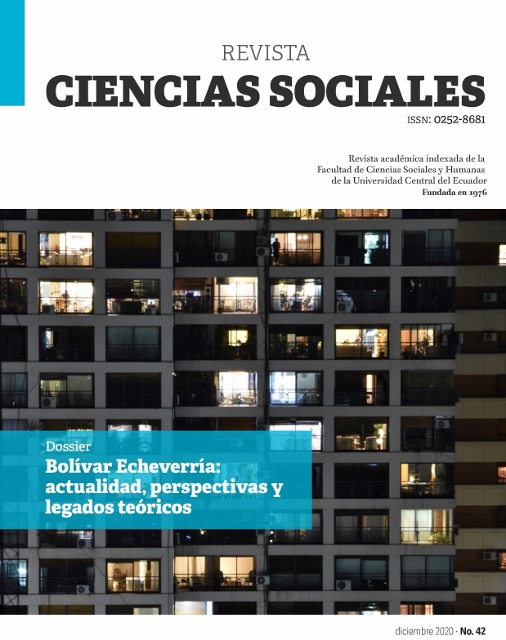The end of philosophy as the horizon of Bolívar Echeverría’s reflection
DOI:
https://doi.org/10.29166/csociales.v1i42.2770Keywords:
critical thought, end of philosophy, western thought, Bolívar EcheverríaAbstract
In our understanding, one of the fundamental traits of Bolívar Echeverría’s thought lies in his constant attack on limits. His intellectual task took him beyond, both disciplinary topics and any other corset that could constrain or restrict the movement of his stubborn search for new horizons. Bolívar Echeverría’s reflection was in permanent movement, his thought was a living entity, which today, as Socrates demands in the Phaedrus, stands on its own feet and defends itself without the help of its father (275e). In Echeverría it was a question of a militancy in the dialectical exercise. Our distinguished thinker was in constant discussion, always in dispute, transcending limits, crossing borders to produce the new, the surprise of illumination, the miracle of birth, of unveiling. Seen this way, there is in Echeverría a Socratic trait, a tireless vocation to question the world in order to force it to rethink itself, to remake itself. The inquiry that we present here attacks the problem of philosophical thought today, it is an interpellation of its function and its destiny, it is therefore once again a confrontation with the limits.
Downloads
Downloads
Published
How to Cite
Issue
Section
License
Copyright (c) 2020 Oscar Llerena Borja

This work is licensed under a Creative Commons Attribution-NonCommercial-NoDerivatives 4.0 International License.
Política de acceso abierto
La revista Ciencias Sociales adhiere al modelo Acceso Abierto en el que los contenidos de las publicaciones científicas se encuentran disponibles a texto completo libre y gratuito en Internet, sin embargos temporales, y cuyos costos de producción editorial no son transferidos a los/las autores/as.
En ese sentido, no existe costo alguno para los/as autores/as en el envío o durante el proceso editorial, defendiendo el derecho a la información con equidad e iguales oportunidades de acceso.
Licencia y derechos de autor/a
Los autores conservan todos los derechos de publicación del artículo y conceden a la Revista Ciencias Sociales una licencia no exclusiva, intrasferible y sin regalías por duración ilimitada para su reproducción, distribución y comunicación pública a nivel mundial bajo una Licencia Creative Commons Atribución 4.0 Internacional (CC BY NC 4.0)


